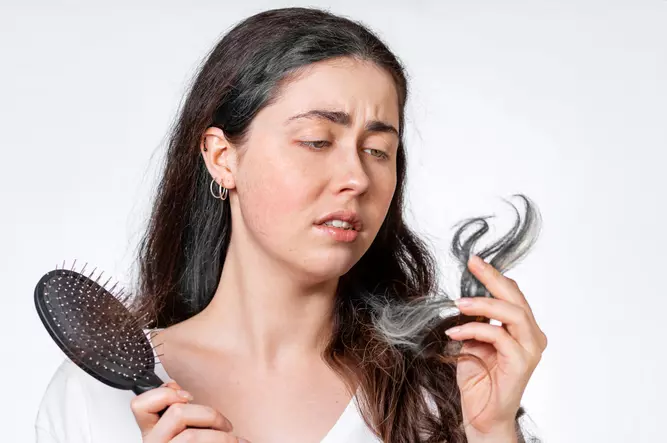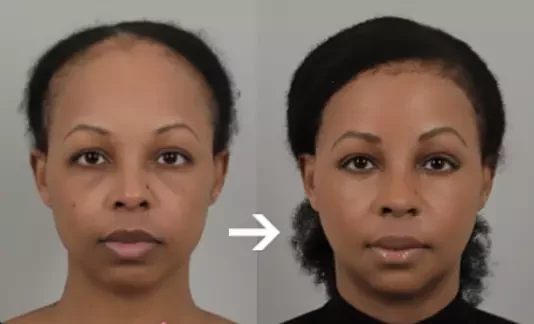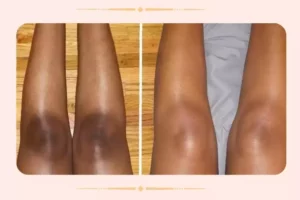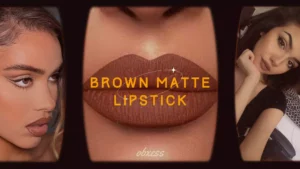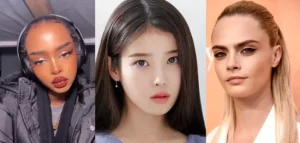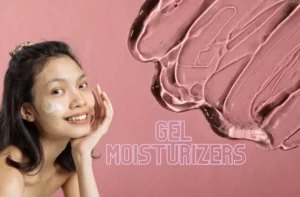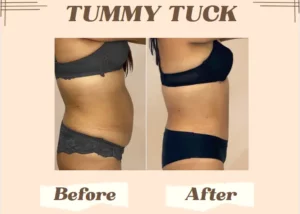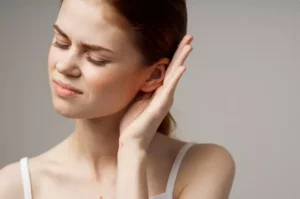See the best products and natural remedies for how to reverse thinning hair after menopause.
Menopause is a transformative phase in a woman’s life, but it often comes with a range of physical changes, including hair loss. You may have noticed your once full head of hair seems to fall out in clumps in the shower or your hairline appears to be receding higher than it once was.
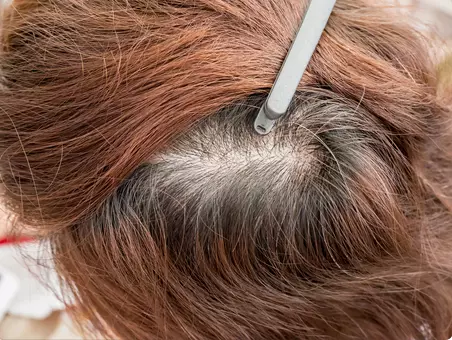
Experiencing thinning hair is a frustrating reality that many women meet and may not know how to deal with as we usually associate hair loss with men balding. In this article, we’ll delve into the causes of hair loss during menopause, explore the possibility of reversing it, and provide you with valuable tips on regrowing and maintaining your crowning glory.
Understanding Hair Loss During Menopause
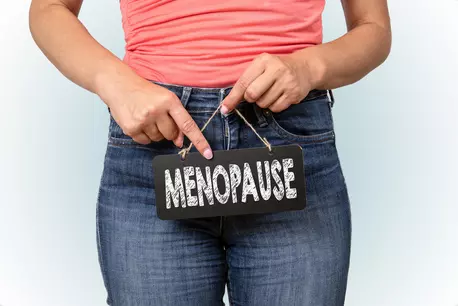
During menopause, hormonal shifts play a significant role in hair loss. The decline in estrogen levels and the increased presence of androgens contribute to the weakening of hair follicles, leading to thinning hair. Additionally, aging itself can slow down hair growth and result in decreased hair volume. These factors combined make hair loss during menopause a common concern for women.
How To Reverse Thinning Hair After Menopause
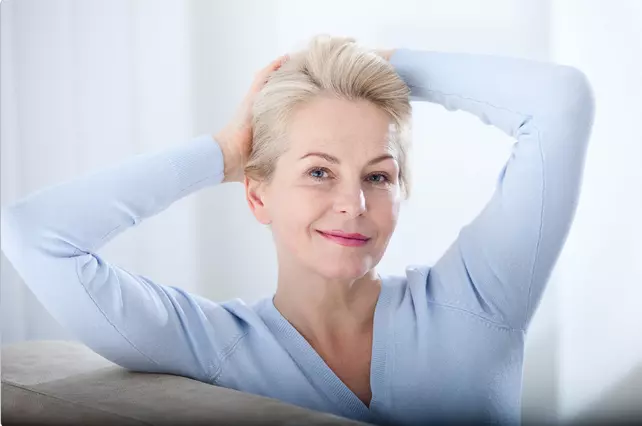
While completely reversing hair loss after menopause may be challenging, it is possible to improve the health and appearance of your hair. With these natural remedies and products, you can stimulate hair growth, increase volume, and regain your confidence.
Natural Remedies For Thinning Hair
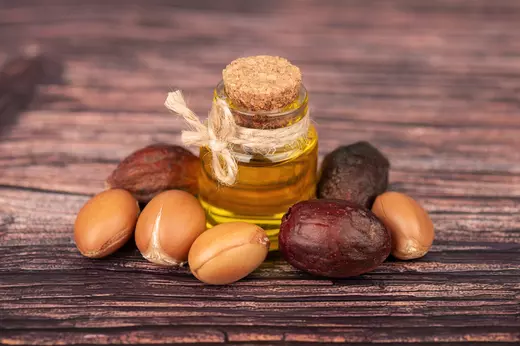
Nourish Your Body: Eat a balanced diet rich in vitamins and minerals that support hair health, such as vitamins A, C, E, and Biotin (B7), as well as minerals like zinc and iron. Include foods like leafy greens, eggs, nuts, seeds, fish, and fruits to ensure adequate nutrient intake.
Practice Stress Management: Chronic stress can exacerbate hair loss. Incorporate relaxation techniques like meditation, yoga, or deep breathing exercises into your daily routine to reduce stress levels.
Scalp Massages: Gently massaging your scalp stimulates blood flow and promotes hair growth. Use natural oils like coconut or olive oil during the massage to nourish your hair follicles.
Aloe Vera: The gel from the aloe vera plant contains enzymes that promote hair growth. Apply aloe vera gel directly to your scalp and leave it on for 30 minutes before rinsing.
Saw Palmetto: This herbal remedy is known for its ability to inhibit the conversion of testosterone into dihydrotestosterone (DHT), a hormone linked to hair loss. Consult with a healthcare professional before using any herbal supplements.
Essential Oils: Natural, essential oils like lavender, rosemary, jojoba, and peppermint have been shown to improve hair growth and thickness. Mix a few drops with a carrier oil, such as jojoba or coconut oil, and apply it to your scalp.
Avoid Heat Styling and Chemical Treatments: Excessive heat, styling tools, and harsh chemical treatments can damage hair and inhibit growth. Limit the use of heat styling tools, and avoid chemical treatments like perming, straightening, or coloring as much as possible.
Gentle Hair Care: Use a mild shampoo and conditioner that suit your hair type and avoid over-washing, as it can strip the hair of its natural oils. Be gentle when detangling your hair, and avoid brushing or combing while wet, as wet hair is more prone to breakage.
Best Products for Thinning Hair
There are several products available on the market that are designed to address thinning hair and promote hair growth. While results will vary per individual, these are few of the highest rated over-the-counter products to help regrow hair.
Rogaine Women’s 5% Minoxidil Foam
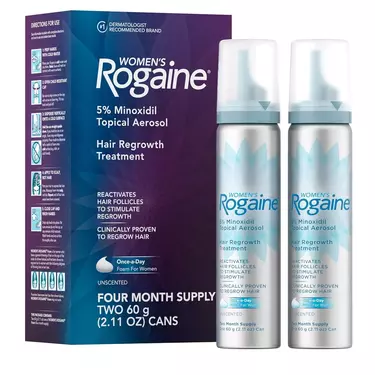
Rogaine Women’s 5% Minoxidil Foam is an FDA-approved tropical foam specifically formulated for women experiencing hair loss. An effective product for women wanting to know how to reverse thinning hair after menopause. This fast-working hair growth treatment is made with 5% Minoxidil and is clinically proven to regrow hair and works to boost hair follicle activity and hair protein production
Nutrafol Women Hair Growth Supplement
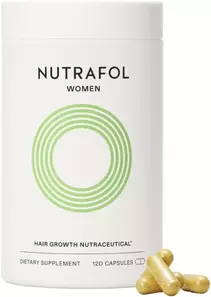
Nutrafol Women Hair Growth Supplement for women 45+ contains a blend of botanical ingredients that target multiple underlying causes of hair loss, including hormones, stress, and inflammation. It is physician-formulated to improve hair growth from within by targeting the 6 root causes of thinning hair in postmenopausal women—including hormone shifts and metabolism.
Bellisso Biotin Shampoo and Conditioner Set
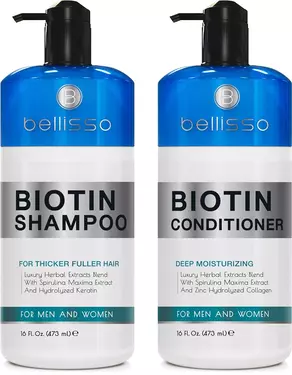
The Bellisso Biotin Shampoo and Conditioner Set has been specially formulated to help you achieve the appearance of thicker hair with its biotin and keratin enriched formula. Bellisso’s thickening shampoo and conditioner for fine hair coats each strand to give you the feeling of more luxurious, fuller locks. It contains no harsh chemicals, sulfates, or parabens so it is safe for all hair types, including sensitive scalps.
RevitaLash Cosmetics Hair Volume Enhancing Foam
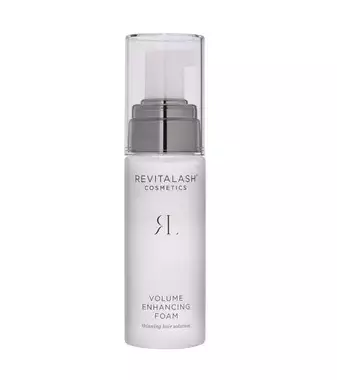
RevitaLash Cosmetics Hair Volume Enhancing Foam is a lightweight foam hair enhancer designed to address the needs of fine and thinning hair for men and women. It contains biotin, peptides, and plant extracts that improve the density and volume of your hair. Simply apply the foam to your scalp daily for a fuller, more vibrant mane.
HairMax Laser Hair Growth Comb

HairMax Laser Hair Growth Comb is an innovative device that utilizes low-level laser therapy to stimulate hair follicles and promote regrowth. Simply comb the laser through your hair for a few minutes a day to improve hair density and thickness over time. HairMax laser devices are proven to regrow hair with an average hair count increase of 129 additional new hairs per sq. inch. after six months in clinical studies.
Related: Sour Power : Apple Cider Vinegar Benefits For Hair
Treatments To Reverse Hair Loss After Menopause
If all else fails and you’re looking for more drastic and permanent measures to combat hair loss after menopause, there are few surgical procedures and scalp treatments you can do to regrow thinning hair.
Hair Transplantation
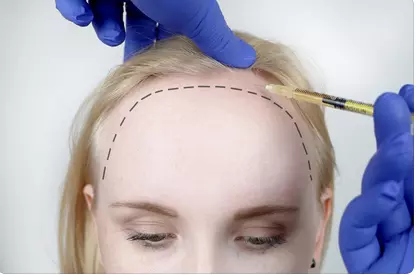
This procedure involves taking hair follicles from areas of the scalp where hair growth is still dense (usually the back or sides of the head) and transplanting them into the thinning or balding areas. Hair transplantation can be an effective option for women experiencing patterned hair loss (androgenetic alopecia) after menopause. However, the success of the procedure depends on the availability and quality of donor hair.
Scalp Reduction
For those wanting to know more surgical ways on how to reverse thinning hair after menopause, a scalp reduction is a highly effective method. This surgical technique involves removing sections of the bald scalp and pulling together the remaining hair-bearing scalp to reduce the bald area. The goal is to create a more balanced appearance and reduce the visible balding scalp area. Scalp reduction is typically used in cases where there is a significant amount of baldness rather than just thinning hair.
Platelet-Rich Plasma (PRP) Therapy
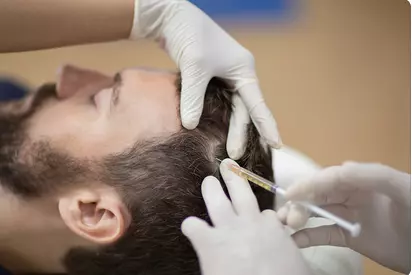
PRP therapy involves using a patient’s own blood plasma, which is rich in growth factors, to stimulate hair growth. The procedure involves drawing blood, processing it to extract the platelet-rich plasma, and then injecting the plasma into the scalp. PRP therapy has shown promising results in improving hair density and thickness in some cases.
Hormone Therapy
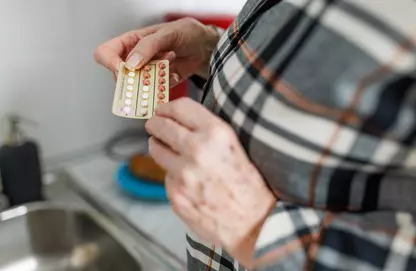
Hormone replacement therapy (HRT) may be considered for women wanting to know how to reverse thinning hair after menopause if they’re experiencing hair loss due to hormonal imbalances. HRT involves taking estrogen and, in some cases, progesterone to help rebalance hormone levels and help with hair growth. However, it’s important to discuss the potential risks and benefits of hormone therapy with a healthcare provider, as it may have other implications for your overall health.
Low-Level Laser Therapy (LLLT)
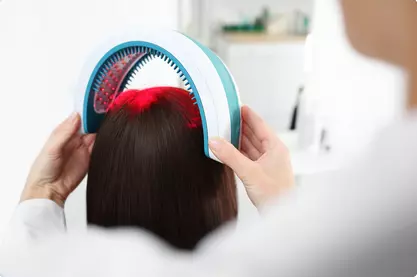
LLLT involves the use of laser devices or combs that emit low-intensity laser light onto the scalp. The treatment has been found to be effective in stimulation hair growth, especially with those suffering from hair disorders like alopecia. The laser light energy stimulates hair follicles to promotes hair growth. LLLT is non-invasive, painless, and considered a generally safe treatment option for women looking for non-surgical ways on how to reverse thinning hair after menopause.
Read More:
- Use a Scalp Scrub to Say Goodbye to Stinky Scalp
- Toning Hair At Home: Skip The Salon And Do It Yourself

